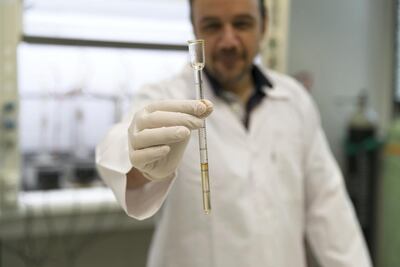Over the millennia, date palms have supplied people with much more than food.
Cultivated for as many as 6,000 years, the date palm has provided leaves used to make baskets, while its seeds have been burnt to produce charcoal.
Oils extracted from date pits (the stones inside the dates) have gone into soap and cosmetics, while the seeds have been given to animals as feed.
The UAE has more than 40 million date palms, many grown for their dates, while others are there to improve the look of town and cityscapes. After all, as an ornamental plant there is nothing to beat the date palm.
Although some historical uses of date palms were decidedly low-tech, science is creating new ways in which parts of this favourite plant and its fruit could be exploited.
For example, scientists at UAE University in Al Ain, the Masdar Institute in Abu Dhabi and Heriot-Watt University Dubai Campus have been looking at date pits as a source of biodiesel. Although sometimes used for soap oils or as animal feed, date pits are often considered waste.
“It’s a waste material. It’s not a valuable material we’re looking at … We’re making use of it before we discard it … Anything we can get of value out of it will be a positive,” said Dr Sulaiman Al Zuhair of UAE University.
The recent study, entitled Biodiesel Production from Oils Extracted from Date Pits, was published in the journal Green and Sustainable Chemistry.
Biodiesel is often seen as being environmentally friendly as it releases carbon recently removed from the atmosphere.
However, there are environmental drawbacks associated with growing oil-rich crops such as rapeseed, oil palms or soybean particularly to produce biodiesel.
The crops take up land that could be used for growing food. This leads to concerns over what environmental groups describe as “indirect land use change”, such as when biodiesel crops displace food crops, which are then grown on land that had been in its pristine natural state.
Therefore, alternative sources of biodiesel, such as using waste products like date pits, are especially attractive.
In this study, the researchers extracted date pits from the popular Khalas date variety, cleaned them, then sun dried them for two days before grinding and sieving them. A solvent extracted the oil, with the yield relative to the weight of the pits reaching up to 11.7 per cent. This is of a quality similar to vegetable oils used to create biodiesel, and it can be converted into biodiesel with an efficiency of about 90 per cent.

Another of the paper’s authors, Dr Emad El Najjar, also of UAE University, said the wide availability of date pits meant they were potentially suitable as a source of biodiesel.
“One of the biggest challenges for biodiesel is whether there’s a consistent source of biomass,” said Dr El Najjar.
He said using date palm pits as sources of biodiesel would help the UAE to play its part in the “great trend” towards sustainable fuels.
“The UAE is trying to keep up with this trend. They’re motivating researchers to pursue renewable sources of energy,” he said.
“Biodiesel is considered one of the smart choices. It’s almost neutral [with respect to] carbon dioxide, because that’s what was used for growing these plants, so it will balance out.”
As well as looking at how much oil they could extract from date pits, the researchers were also interested in the gases produced by burning them. Among the potentially useful gases they recorded were methane, a gas that is burnt to produce electricity, and hydrogen, which is being used to fuel cars.
Date pits contain smaller quantities of oil than some oil crops – oilseed rape, for example, may have an oil content of more than 40 per cent – but the fact that it comes from a waste product makes it especially useful.
“Ten per cent of the amount of the solid is not high, but we’re using waste,” said Dr Al Zuhair, who is also a professor.
_______________
Read more:
Biodiesel production coming to Abu Dhabi
Campaign helps UAE pupils recycle used cooking oil
Is DME the answer to a post-diesel future?
_______________
Even if the quantities of oil generated from date pits are not large enough for mass production, Dr Al Zuhair suggested the biodiesel could instead be used to, for example, run machinery in plants that process the material for other uses.
There is already much interest in biodiesel in the UAE. Leftover grease, fat and oil is collected in Dubai, which has a number of biofuel production plants. Oil recycled from Dubai is also used to produce soap in India.
As reported in The National earlier this year, the capital is also becoming involved thanks to licences from Tadweer, the Centre of Waste Management – Abu Dhabi, for companies to collect waste food and oil for biodiesel production.
Dr El Najjar described the recent scientific paper as “the start” of the scientific material that the researchers are planning to release, with more work lined up for publication.
As well as having more papers in preparation, they are continuing with the research itself.
Dr Al Zuhair is looking into optimising methods for extracting the oil, while Dr El Najjar is further analysing the emissions produced when the date pits are burnt.
“We are interested in, for example, the effect of size – how the size of the date pits impacts the oil extraction … We’re trying different parameters, different processes,” said Dr El Najjar.
So, in future, as the researchers refine methods for extracting oil and look further into what gases are produced, the date palm, already one of the UAE’s most important agricultural and ornamental plants, is likely to become more useful still.
The other authors of the study are Dr Hanifa Taher of the Masdar Institute, Salama Al Dhaheri and Dr Shereen Wajeeh of UAE University, and Dr Mutasim Nour of Heriot-Watt University Dubai campus.


